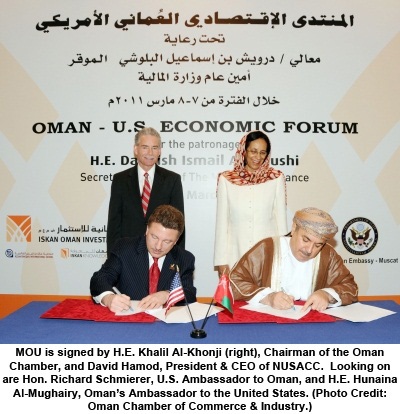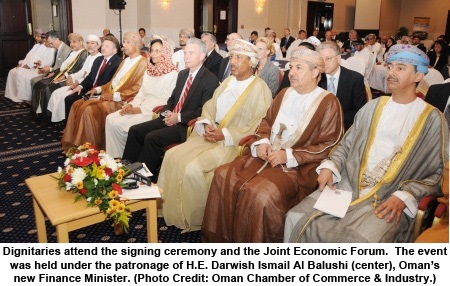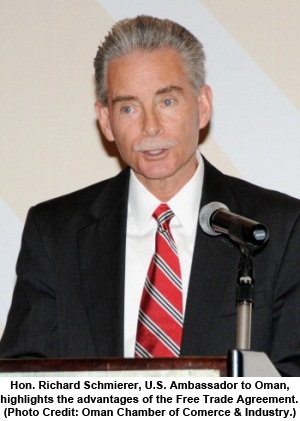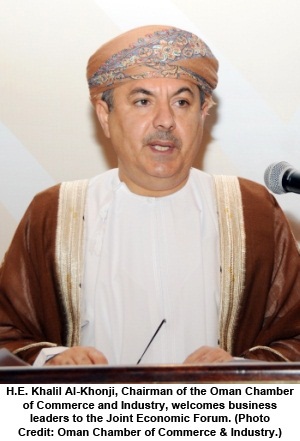U.S.-ARAB CHAMBER AND OMAN CHAMBER
FORM NEW JOINT BUSINESS COUNCIL
Signing Ceremony, Attended by U.S. and Omani
Ambassadors, Takes Place During U.S.-Oman Joint
Economic Forum in Muscat

The National U.S.-Arab Chamber of Commerce (NUSACC) and the Oman Chamber of Commerce and Industry (OCCI) today signed an agreement to establish the Oman-U.S. Joint Business Council (JBC). The accord, inked during the two-day U.S.-Oman Joint Economic Forum, creates a first-of-its-kind entity between the two nations that will have a presence in the capital cities of Muscat and Washington, DC.
In his remarks at the signing ceremony , David Hamod, President & CEO of the U.S.-Arab Chamber, said that NUSACC and OCCI share a "long history of cooperation and mutual respect." It was fitting that the launch take place during the Joint Economic Forum, he suggested, because the Forum revolves around the Oman-U.S. Free Trade Agreement (FTA) that will "doubtless play a key role in the JBC’s efforts to promote trade and investment between our two nations." The Forum also highlighted Public / Private Partnerships, he noted, and the "importance of the business community working hand-in-hand with our government counterparts."
H.E. Khalil Al-Khonji, Chairman of OCCI, noted that the JBC "aims to develop trade and investment relations through the contributions of the private sector and to strengthen joint investments in the legal environment provided by bilateral trade agreements." The new Joint Business Council, he suggested, will "pay ongoing attention to strengthening cooperation and partnership in trade, industry, modern technologies, and the exchange of commercial experts."
In his remarks at the signing ceremony , David Hamod, President & CEO of the U.S.-Arab Chamber, said that NUSACC and OCCI share a "long history of cooperation and mutual respect." It was fitting that the launch take place during the Joint Economic Forum, he suggested, because the Forum revolves around the Oman-U.S. Free Trade Agreement (FTA) that will "doubtless play a key role in the JBC’s efforts to promote trade and investment between our two nations." The Forum also highlighted Public / Private Partnerships, he noted, and the "importance of the business community working hand-in-hand with our government counterparts."
H.E. Khalil Al-Khonji, Chairman of OCCI, noted that the JBC "aims to develop trade and investment relations through the contributions of the private sector and to strengthen joint investments in the legal environment provided by bilateral trade agreements." The new Joint Business Council, he suggested, will "pay ongoing attention to strengthening cooperation and partnership in trade, industry, modern technologies, and the exchange of commercial experts."

Ambassadors from both nations participated in the signing ceremony. H.E. Hunaina Al-Mughairy, Oman’s Ambassador to the United States, stated, "The establishment of this new Business Council is a recognition that Oman - U.S. commercial relations are on an upward trajectory. OCCI and NUSACC are ideally suited to serve as gateways to Oman and the United States, respectively, and I am hopeful that this partnership will help to realize maximum benefits from the Free Trade Agreement shared by our two nations."
The two-day Joint Economic Forum drew more than 200 business representatives from the United States and Oman. Supported by NUSACC and organized by the U.S. Embassy, OCCI, and the Iskan Oman Investment Company, the Forum was held under the patronage of H.E. Darwish Ismail Al Balushi, who has just been appointed as Oman’s Minister Responsible for Financial Affairs.
Four sectors in particular were highlighted during the Forum: infrastructure, energy, education, and healthcare. Break-out sessions concentrated on investment opportunities in Oman and the United States, commercial and tax laws, shipping requirements, contract negotiations, and strategies for identifying prospective partners in both nations.
The two-day Joint Economic Forum drew more than 200 business representatives from the United States and Oman. Supported by NUSACC and organized by the U.S. Embassy, OCCI, and the Iskan Oman Investment Company, the Forum was held under the patronage of H.E. Darwish Ismail Al Balushi, who has just been appointed as Oman’s Minister Responsible for Financial Affairs.
Four sectors in particular were highlighted during the Forum: infrastructure, energy, education, and healthcare. Break-out sessions concentrated on investment opportunities in Oman and the United States, commercial and tax laws, shipping requirements, contract negotiations, and strategies for identifying prospective partners in both nations.

Much of the discussion at the Forum revolved around ways to maximize the bilateral Free Trade Agreement that entered into force on January 1, 2009. The FTA phases out all customs duties over time, it accords national treatment to Omani and American firms, and it eliminates the need to appoint local sponsors or agents.
The U.S. Ambassador to Oman, Hon. Richard J. Schmierer, noted that although the FTA "went into effect in a challenging economic climate - during the depths of the recent global recession - today we are seeing encouraging signs of economic recovery. With both Oman and the United States now experiencing sustained economic growth, we are seeing a heightened interest in business and investment opportunities worldwide, and we are confident that the current climate of economic optimism will further stimulate bilateral trade."
Within two years, Oman is expected to become the eighth largest destination in the Arab world for U.S. goods and services, according to a new study by the National U.S.-Arab Chamber of Commerce. Oman is on track to become America’s top FTA partner in the Arab world, responsible for more than $3 billion in U.S. exports per year, by 2013. Equally important, market share in Oman for U.S. merchandise is expected to grow from 5.4 percent in 2010 to 8.3 percent in 2013. The top five exporting States include Texas, Washington, Maryland, New Jersey, and California.
"Oman has a reliable and transparent legal system, a flat corporate tax rate of 12 percent, and a variety of incentives in its special economic zones," noted Elizabeth Powers, Commercial Officer at the U.S. Embassy in Muscat. But perhaps the most attractive feature of Oman, she suggested, is its quality of life. "Oman is a home away from home: welcoming, navigable, and with a treasure of natural wonders to explore each weekend."
The U.S. Ambassador to Oman, Hon. Richard J. Schmierer, noted that although the FTA "went into effect in a challenging economic climate - during the depths of the recent global recession - today we are seeing encouraging signs of economic recovery. With both Oman and the United States now experiencing sustained economic growth, we are seeing a heightened interest in business and investment opportunities worldwide, and we are confident that the current climate of economic optimism will further stimulate bilateral trade."
Within two years, Oman is expected to become the eighth largest destination in the Arab world for U.S. goods and services, according to a new study by the National U.S.-Arab Chamber of Commerce. Oman is on track to become America’s top FTA partner in the Arab world, responsible for more than $3 billion in U.S. exports per year, by 2013. Equally important, market share in Oman for U.S. merchandise is expected to grow from 5.4 percent in 2010 to 8.3 percent in 2013. The top five exporting States include Texas, Washington, Maryland, New Jersey, and California.
"Oman has a reliable and transparent legal system, a flat corporate tax rate of 12 percent, and a variety of incentives in its special economic zones," noted Elizabeth Powers, Commercial Officer at the U.S. Embassy in Muscat. But perhaps the most attractive feature of Oman, she suggested, is its quality of life. "Oman is a home away from home: welcoming, navigable, and with a treasure of natural wonders to explore each weekend."

The FTA was given a boost last year when the U.S. Department of State signed a Memorandum of Understanding (MOU) with Oman to promote the productivity of small and medium-sized enterprises (SMEs) in conjunction with the U.S. Small Business Administration. More than 160,000 member companies are registered with the Oman Chamber of Commerce and Industry, and the vast majority of these are SMEs.
Entrepreneurship, job creation, and strategies for start-ups are among the topics that the new Joint Business Council is expected to address. OCCI and NUSACC also pledged to work together to remove barriers to trade, to initiate joint ventures, and to promote capacity-building through professional training.
Concluded NUSACC’s David Hamod, "Today, as we begin this new journey together, we will celebrate the inauguration of the Oman-U.S. Joint Business Council by redoubling our efforts to promote trade and investment between our two nations, thereby generating new jobs through increased commerce. Today’s ceremony opens a new chapter in a formal economic relationship between Oman and the United States that extends back more than 175 years, and I am confident that our successes of the past will serve as milestones that help to guide us toward an even brighter and more prosperous future for both of our peoples."
Entrepreneurship, job creation, and strategies for start-ups are among the topics that the new Joint Business Council is expected to address. OCCI and NUSACC also pledged to work together to remove barriers to trade, to initiate joint ventures, and to promote capacity-building through professional training.
Concluded NUSACC’s David Hamod, "Today, as we begin this new journey together, we will celebrate the inauguration of the Oman-U.S. Joint Business Council by redoubling our efforts to promote trade and investment between our two nations, thereby generating new jobs through increased commerce. Today’s ceremony opens a new chapter in a formal economic relationship between Oman and the United States that extends back more than 175 years, and I am confident that our successes of the past will serve as milestones that help to guide us toward an even brighter and more prosperous future for both of our peoples."





